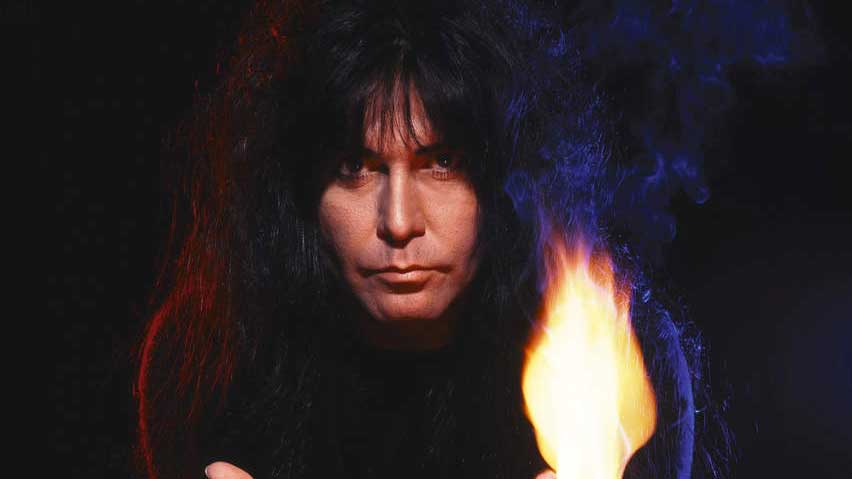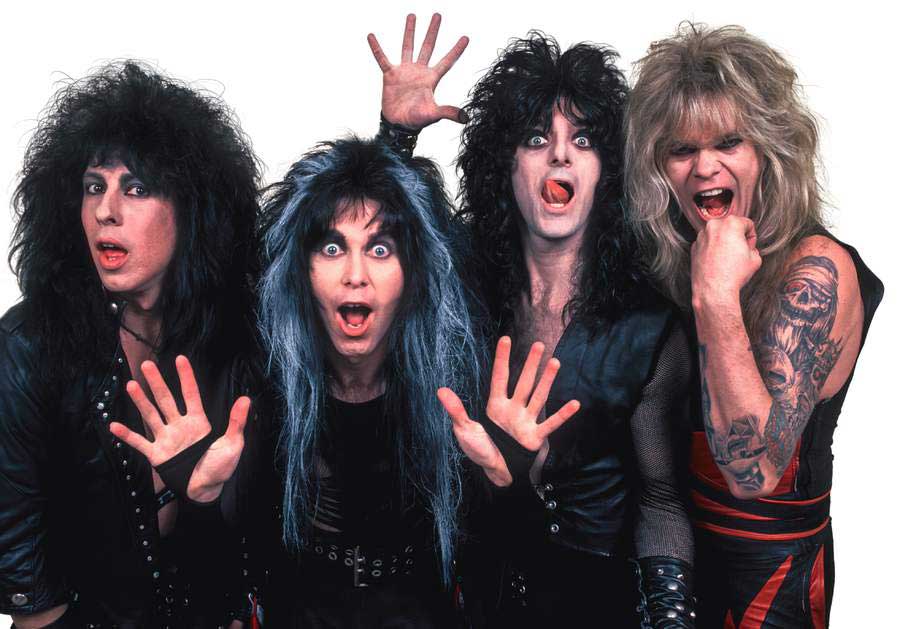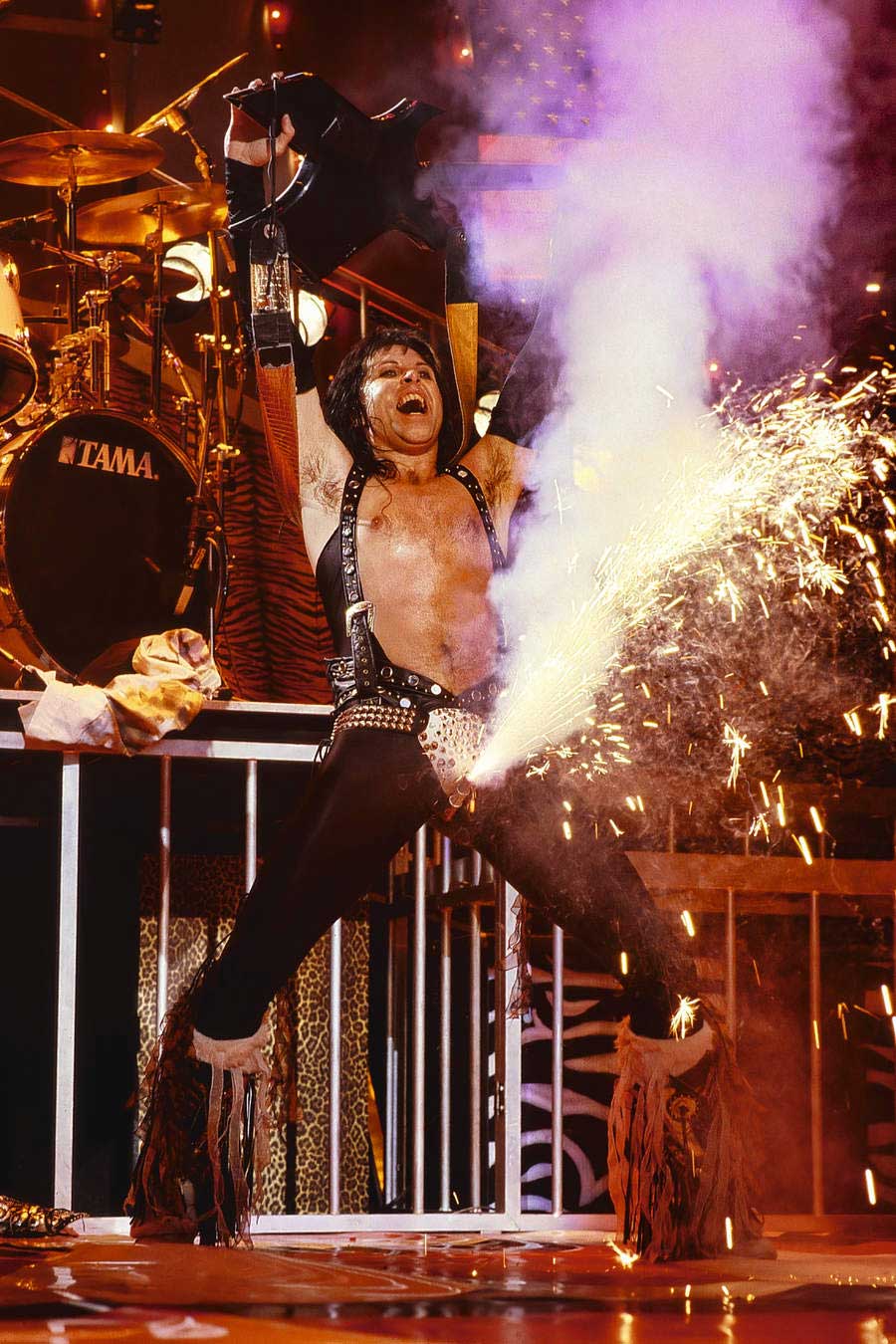WASP’s Blackie Lawless: "We’re still here... which I’m sure some people aren’t happy about"
Hounded by self-appointed guardians of the world’s uncorrupted youth, stalked by religious groups, shot at, WASP could easily have packed it in. But after 40 years, they're still going strong

Blackie Lawless knew things had got out of hand when somebody tried to kill him. It was 1985, and the mastermind behind controversial shock rockers WASP was America’s new favourite bogeyman. It’s not clear exactly why the puritanical right objected to Lawless and his band. It could have been the fact that their name reputedly stood for ‘We Are Sexual Perverts’. It might have been that their debut single was a leering ode to sex, titled Animal (Fuck Like A Beast), with a sleeve featuring a close-up of Lawless’s crotch in a ridiculous buzzsaw codpiece. Or maybe it was their infamous live shows, featuring topless models tied to racks, and the frontman hurling chunks of raw meat out into the audience. It’s a real head-scratcher.
Anyway, back to that alleged assassination attempt. Lawless had a place in the Hollywood Hills at the time, surrounded by a bunch of scrub and brush. As he ambles out of his house on this particular day, all six-footfour of him, he sees some guy lurking in the near distance, 30 or 40 yards away, watching him. As soon as the guy clocks that Blackie has spotted him, he dives into the bushes.
“That’s a little odd,” Blackie thinks as he gets into the 1967 E-Type Jaguar his infamy had bought him and fires it up to head to the studio where WASP are recording their second album, The Last Command.
It’s not until he get on the freeway that things start going wrong. As the needle hit 55mph, one of his front wheels comes off and spins away in front of him. The car begins to swerve across all four lanes. As Lawless wrestles with the steering wheel, he glances in his rearview mirror and sees an 18-wheel truck bearing down on him.
“That’s it,” he thinks. “I’m gonna die right here.” Except he doesn’t die. He slams on his brakes, the truck driver slams on his breaks, there’s smoke everywhere. After a few hairy seconds the Jag screeches to a halt, and so, miraculously, does the truck. There’s just a couple of feet between them.
Blackie manages to get the car to a mechanic he knows, and the grease monkey drops a bombshell: “These wheels have been tampered with,” he tells Blackie. “You should be dead.” Looking back at that alleged attempt on his life almost four decades later, Blackie Lawless is sanguine. “I would say the bulk of our fans saw what we were doing as radical,” he says now. “Maybe ten per cent saw the humour in it. But the older generation saw us as something absolutely dangerous, and that we had to be stopped.”

It wasn’t just homicidal religious nut-jobs who misunderstood WASP. The whole world has been getting them wrong for the past 40-odd years. Sure, in their original liver ’n’ codpiece incarnation they were the embodiment of 80s heavy metal thunder and damnation – an OTT Marvel Comics update of Alice Cooper’s slyly subversive shock-rock from a decade earlier.
Sign up below to get the latest from Classic Rock, plus exclusive special offers, direct to your inbox!
Yet WASP were way more than the blooddrenched bozos they’ve long been pegged as. They could play dumb when they needed to – hit singles such as Wild Child, redneck-baiting drinking anthem Blind In Texas and Mean Man were bolshy 80s metal anthems whose brains were hanging out of their pants. But playing dumb and being dumb are two separate things. Mötley Crüe, bless ’em, were top of the medal table at heavy metal’s Stupid Olympics. WASP, on the other hand, were the smartest dumb band on the planet.
Exhibit A in the case for the defence: their music. Lawless’s singing voice may sound like he downs sandpaper smoothies for breakfast, but he grew up listening to The Beatles and The Who, and those bands’ melodic genius is evident in his band’s best songs. “I often said WASP was really an electric version of the Everly Brothers,” he says. Which isn’t quite as ridiculous as it sounds. “It was based on that two-part harmony. To this day, you listen to our records and it’s all harmony-based.”
Exhibit B in the case for the defence: Lawless himself. Like Arthur Brown, Alice Cooper or anyone who has ever had the words ‘shock rocker’ shoved in front of their name by a tabloid newspaper, there was a fierce intelligence behind the schtick. And Lawless was smart enough to know when to ditch that schtick, wrong-footing his critics with 1989’s grown-up, (largely) shockfree The Headless Children, an album that stands as one of the era’s great unsung masterpieces.
Still, WASP’s infamy and renown passed with the 1980s. They never did become as big as their contemporaries Mötley Crüe, let alone Guns N’ Roses, a band for whom they undoubtedly helped prime innocent ears. But unlike both of those bands, they’ve continued to make great records on a semi-regular basis – 2007’s Dominator or 2015’s Golgotha could go toe-to-toe with old-school WASP classics such as 1984’s self-titled debut or followup The Last Command.
“We’re still here,” says Lawless. “Which I’m sure some people aren’t happy about.”
Before Blackie Lawless was born, his creator could have been a baseball star. Back then he was plain Stephen Duren, a tall kid from Staten Island with a mean throwing arm and a dream of playing in the professional leagues. He’d got the nickname Blackie early on, on account of his jet-black hair. “Part of my Native Indian heritage,” he says proudly.
Somewhere along the way, rock’n’roll got its hooks into him. He’d watched a bunch of face-painted glam-rockers he knew emerge from the clubs of the Big Apple to define American hard rock in the mid-70s. “I was friends with Ace Frehley, and I got a chance to see Kiss being born,” he says. “I identified with the way Gene and Paul were running their camp.”
But it was another hometown band who gave him his first break. Ever the sharp operator, he’d got to know inelegantly wasted glam-punks the New York Dolls. In 1975 the 19-year-old Blackie was down in Florida trying to make something of himself, when an on-their-last-legs Dolls passed through town. “I was at sound-check and [bassist] Arthur Kane came up to me with a strange look on his face,” says Lawless. “I think: ‘Oh no, what have I done wrong?’ But he pulls me aside goes: ‘There’s trouble here. Do you want to join the band?’”
A week later, Lawless was the guitarist in the New York Dolls, replacing the terminally whacked-out Johnny Thunders. “I walked into a situation that was effectively five guys trying to be Jim Morrison, and I could not relate to that at all,” he says. “But you’re nineteen years old and you’re looking to get off the ground somehow.”
He played just two gigs with the Dolls before the wheels came off the whole thing. It wasn’t a total write-off: he and Kane schlepped across the country to LA, where they put together the short-lived Killer Kane Band (on the one EP they made, Lawless is credited as Blackie Goozeman). Soon Kane headed back to New York, but his protégé stayed put.
A string of bands followed: Sister (who briefly included a bassist named Frank Ferrana, soon to change his name to Nikki Sixx); Circus Circus; a blink-and-you’ll-miss-it stint in Sunset Strip quasi-legends London. Along the way, Blackie Goozeman changed his stage name, taking inspiration from American football player Burton Lawless. And thus Blackie Lawless was born, and soon after so was WASP.

To hear Lawless describe it, the early-80s Sunset Strip scene was as much gladiatorial arena as it was non-stop bacchanal. “There was a camaraderie, but it was waning,” he says. “People would step on each other’s bodies to get to the top.
“All these people from little towns across America had come to LA to make it. They were all these type-A personalities. They’d been voted ‘Most Popular’ or ‘Most Likely To…’ in their little towns, and they get there and suddenly they realise the competition is extraordinarily fierce. When you peel away the veneer of anything like that you’re gonna see where the ugliness is. People would get used up really quickly.”
Lawless had been around long enough by that point to know he didn’t want to be one of them. Rather than duking it out in the clubs with all the other bands trying to get a deal, WASP holed up in the studio to hone the songs that would appear on their debut album.
“When we started we had no intention of playing live,” he says. “We demoed that first album four times. By the time we finished the fourth one, me and Chris looked at each other and said: ‘Okay, these are good enough to take out and test in front of people.’”
‘Chris’ was Chris Holmes, WASP’s man-mountain guitarist, and Chewbacca to Lawless’s Han Solo. Holmes’s wild streak was the polar opposite of Lawless’s laser-focused ambition – the brawn and the brains. When they finally did hit the clubs, the pair’s physical presence alone made the band an attention-grabbing proposition. And then there was all the other stuff.
“I’d love to tell people that there was some master plan, but that’s not the way it happened,” Lawless admits now. “We said: ‘Are we just gonna stand there and just look at each other? Or are we gonna try and do some sort of show?’”
WASP’s performances made Alice Cooper’s show look like a pre-teens pantomime. There was fire and flash-bombs. Lawless hacked up raw meat with an axe and hurled the pieces into the audience. He drank blood theatrically from a skull (at one stage they headlined a blood drive for the Red Cross, only for the latter to reportedly ditch the supplies they’d received after hearing rumours that Lawless was drinking animal blood). And then there was the ‘highlight’ of the show, in which a hooded woman was brought on stage, only to have her throat ‘slit’. It was tasteless, of course, and it certainly wouldn’t wash today, but it got WASP noticed. As did their debut single, Animal (Fuck Like A Beast).
Released in April 1984, Animal would provide an early indicator of what was to come. WASP’s record company, Capitol, blanched at releasing it, and enlisted rising UK indie label Music For Nations to put it out and take the flak instead. Forget the attention-grabbing title, it’s an 80s metal Hall Of Famer – even if it’s not quite the Everly Brothers. That brilliance extended across WASP’s self-titled debut album via tracks such as Sleeping In The Fire, L.O.V.E Machine and immortal self-empowerment anthem I Wanna Be Somebody.
In the past, Lawless has talked about Animal being a deliberate shock tactic, an attempt to grab people’s attention. Today he sidesteps the question of what he thinks about it, with a long anecdote involving Marvin Gaye, the gist of which is that the soul legend once told an acquaintance of Lawless that every artist should “make the record that reflects who they are at that moment in their life”.
“That was one of the things that was imprinted on me with a branding iron,” Lawless says eventually. “Be who you are at that moment.”

What Blackie Lawless or Marvin Gaye didn’t know was just how notorious Animal (Fuck Like A Beast) and their stage show would make WASP. That became apparent when the band arrived in London in September 1984 for their first UK tour.
“We land at the airport and there’s all kinds of press people there to meet us,” Lawless recalls “We didn’t know what was happening. So we pile in the cars and drive off. We stopped at a light, and I look over and see a newsstand, and there are these big headlines: ‘American Sex And Blood Rock Group Banned In Ireland’. I looked over at Chris and I go: ‘Son of a bitch, some band has come over here and stolen our thunder.’ Then we get to the hotel, and guess what…”
The puritans of Britain hadn’t taken well to the idea of these liver-tossing, woman-torturing rock monsters arriving on their shores. An issue of Kerrang! magazine featuring a blood-drenched Blackie on the cover was pulled from the racks of newsagents WHSmith. A show in Ireland was cancelled. The band were allegedly forced to sign contracts guaranteeing they wouldn’t release rats on stage. Even then, the shows that did happen were picketed by religious groups.
“There was a vicar and his congregation who would follow us around to every show we did in the UK,” says Lawless. “These people would buy tickets and come into the show, and they’d stand in the back praying the whole time.”
It was weird and funny at the time. But back home in America things were about to get a lot weirder and a damn sight less funny. Elizabeth ‘Tipper’ Gore was the wife of rising US Senator and future Presidential Candidate Al Gore. She had founded pro-censorship group the Parental Music Resource Center (PMRC) with a group of other so-called ‘Washington Wives’, who drew up a list of ‘obscene’ songs they called The Filthy Fifteen. And in with a bullet at number nine was Animal (Fuck Like A Beast).
Being a public enemy had its upsides – Lawless got to know Frank Zappa, who became a self-appointed human shield for the bands on the PMRC’s shitlist – but mostly it made life harder for WASP. “It started getting ugly,” Lawless says.
Their next two albums – 1985’s glorious The Last Command and 1987’s Inside The Electric Circus – carried the momentum, but the band were under siege from the moral majority. They ditched most of the OTT on-stage visuals after their first album, but the swivel-eyed Christian right continued to picket their shows. Venues received bomb threats and gigs were cancelled. Lawless says he personally got “more than a thousand death threats in the post”. There was the incident with his sabotaged car, which could have killed him, and he claims he was shot at on more than one occasion.
To this day, he insists the PMRC was set up as a political machine to raise the profile of Tipper’s husband Al Gore. “What better way to get attention for themselves than to go after an attention-getter?” he says.
Lawless never did meet Tipper Gore, although he came close. In 1987, film-maker Penelope Spheeris arranged to get the two of them in a room together for a scene in her new film The Decline Of Western Civilisation Part II: The Metal Years. The day before filming, Spheeris called Lawless to tell him Gore had pulled out.
“She goes: ‘If you can’t think of anything else, do you mind if I interview Chris Holmes instead?’” says Lawless. He ran the idea past his manager, Rod Smallwood. “He goes: ‘What do you think?’ And I shrugged my shoulders and said: ‘How bad can it be?’”
Pretty bad, it turned out, at least for one person. The barely coherent Holmes wasn’t just drunk in the film, he was knocking back vodka from the bottle. While laying on a lilo in a swimming pool. With his mother looking on disapprovingly. To most people it was comedy gold. Not Lawless.
“No, no,” he says, sounding exasperated even all these years later. “We were just getting ready to release The Headless Children. I’ve made this big political statement, I’m trying to do something socially relevant, and I got a guitar player who can barely put two sentences together. Was that the message I wanted to put out?”
Chris Holmes getting trolleyed on a lilo in front of his mum didn’t hole WASP’s career. The Headless Children, released in 1989, was their best and boldest album yet. The only shocking thing about it was how grown up these former enfants terrible had become. The guy who screeched ‘I got pictures of naked ladies lying on their beds’ like a horny teenager on Animal was now singing about the threat of nuclear war and the misery of heroin addiction, and covering The Who and Jethro Tull.
“We separated ourselves from everything else that was going on, especially in LA,” Lawless says now. “We cut and ran and we never looked back. And that saved us.” The Headless Children would be WASP’s high-water mark. The follow-up, 1992’s The Crimson Idol, was a full-blown rock opera – Lawless’s own version of Tommy or The Wall, except without the sales. Or the band members – it was a Blackie Lawless solo album in all but name after Chris Holmes quit to spend time with his wife, former Runaways guitarist-turned-solo star Lita Ford.
WASP’s 1990s followed exactly the same path as that of most of their contemporaries, in that it was tough. They made some good albums along the way (1999’s Helldorado) and the odd dud (1995’s wrong-headed industrial-metal turkey Kill. Fuck. Die), but the band had lost their sting.
“It was rough, I’m not gonna lie,” Lawless says of that blighted decade. “There were times when we didn’t know if we’d make it to the end of the decade. If we hadn’t separated ourselves from those other bands we’d been lumped in with we would have died. We survived, but survival and flourishing are two different things.”
Lawless was too stubborn to quit, and WASP ploughed on through it all, right up to today. There was no big commercial turnaround, no overnight resurrection, no sudden realisation that, actually, Blackie Lawless knows how to knock out a brilliant tune and all the other stuff just got in the way. Instead they carried on releasing consistently great albums to a reduced but loyal audience.
Along the way something unexpected and, given his past run-ins with irate vicars, ironic happened to Lawless: he found God. More accurately, he rediscovered God. He’d been raised in a staunchly religious house, but left the church as a disenfranchised 18-year-old. In 2005 his dormant faith began to awake.
There was no tipping point for his prodigal-son return. “It didn’t happen overnight, it was a slow, gradual process,” he says. Even now, he has little time for organised religion. “My faith centres on Jesus Christ and the Bible and nothing else.”
After his spiritual reawakening, WASP stopped playing Animal (Fuck Like A Beast). Lawless quoted a verse from the Bible to back up his decision: “Let no corrupt speech come from your mouth.” But when the band embarked on a 40th anniversary tour a few weeks after we spoke, their most notorious track had returned as an encore.
Blackie Lawless might just be mellowing on that front now. He’s at least thinking about it. “You can’t erase those records, and I think I have an obligation to satisfy some people,” he says, evasively.
The fact that a song he wrote 40 years ago is still a point of contention is kind of remarkable. WASP wouldn’t be the band they are without Animal. But they might have been a completely different band, recognised not for shock tactics but for the greatness of their music.
“Did the controversy overshadow everything else?” says Blackie Lawless. “Yeah, maybe it did in the beginning, but it got us noticed. Would I change anything? No. Because when it comes down to it, everything is out of your control."
WASP are currently on tour in The US, and will arrive in The UK in March. Get tickets.
Dave Everley has been writing about and occasionally humming along to music since the early 90s. During that time, he has been Deputy Editor on Kerrang! and Classic Rock, Associate Editor on Q magazine and staff writer/tea boy on Raw, not necessarily in that order. He has written for Metal Hammer, Louder, Prog, the Observer, Select, Mojo, the Evening Standard and the totally legendary Ultrakill. He is still waiting for Billy Gibbons to send him a bottle of hot sauce he was promised several years ago.

